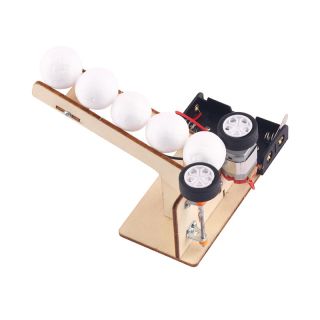All Categories
Hand Crank Generator Kit - Cat# 80-50-W069
In stock
SKU
80-50-W069
CA$6.65
- Buy 2 for CA$6.10 each and save 8%
- Buy 6 for CA$5.55 each and save 17%
Power by Hand — The Hand Crank Generator STEM Kit
Bring electricity to life in your classroom — no batteries needed! With the Hand Crank Generator Kit, students can convert mechanical energy into electrical energy firsthand and power a bulb by turning a crank. It’s a compact, high-impact way to connect motion and circuits.
What’s in the Kit & How It Works
A hand crank mechanism with gear or rotor assembly
Wires and connectors to interface with a small bulb
A bulb (lamp) that lights up when the crank is turned
Teacher’s Resource Guide (accessible via “Additional Resources”) with wiring diagrams, lessons, and background info
When students turn the crank, they apply mechanical energy (rotational motion). The generator’s internal wiring and magnetism convert that motion into electrical energy, which flows through the circuit and makes the bulb glow. No battery is needed.
STEM Concepts Illuminated
This kit is rich with opportunities to explore foundational STEM concepts. Some key connections:
| STEM Area | Key Concepts | Classroom Applications & Extensions |
|---|---|---|
Energy & Conversion | Mechanical → Electrical → Light (and heat) | Students can explore how much crank effort produces how much light; discuss energy losses (friction, heat) |
Electricity & Circuits | Generators, voltage, current, circuit continuity | Students build and complete circuits to power the bulb, test how wiring changes affect output |
Magnetism & Electromagnetism | Magnetic fields, coils, Faraday's law (induced voltage) | For more advanced learners, you can discuss how magnets and coils interact inside the generator to produce current |
Mechanics & Forces | Torque, mechanical advantage, friction | Let students compare how fast or how hard they must crank to light the bulb; try gearing or leverage modifications |
Measurement & Data | Brightness, time, crank speed, comparative trials | Students can record how brightness changes with crank speed or duration, graph results, compare different groups |
Why Teachers Will Love It
Battery-free demonstration — simple, clear, and safe to use
Instant feedback — turning a crank and seeing a bulb light is direct and compelling
Cost-effective & scalable — easy to distribute across student groups
Flexible depth — for younger students focus on circuits and conversion; for older students delve into electromagnetism and generator theory
Teacher support built in — resource guide available through “Additional Resources”
Classroom Activity Ideas
Power Race: Challenge teams to crank as quickly as possible and light their bulbs. Which design or technique is most effective?
Mechanical Advantage Experiment: Let students add gearing (or leverage) to see how effort vs. speed trade-offs affect output
Wiring Variations: Test what happens if wires are lengthened, resistance added, or connections loose
Brightness vs. Speed: Students crank at different speeds (slow vs fast) and record how bright the bulb is; graph output vs speed
Extension Project: Adapt the generator to power a small motor, fan, or LED strip; compare output under load
Let your students literally turn effort into light. With the Hand Crank Generator Kit, they won’t just hear about electricity — they’ll generate it, measure it, and understand its connection to motion.










